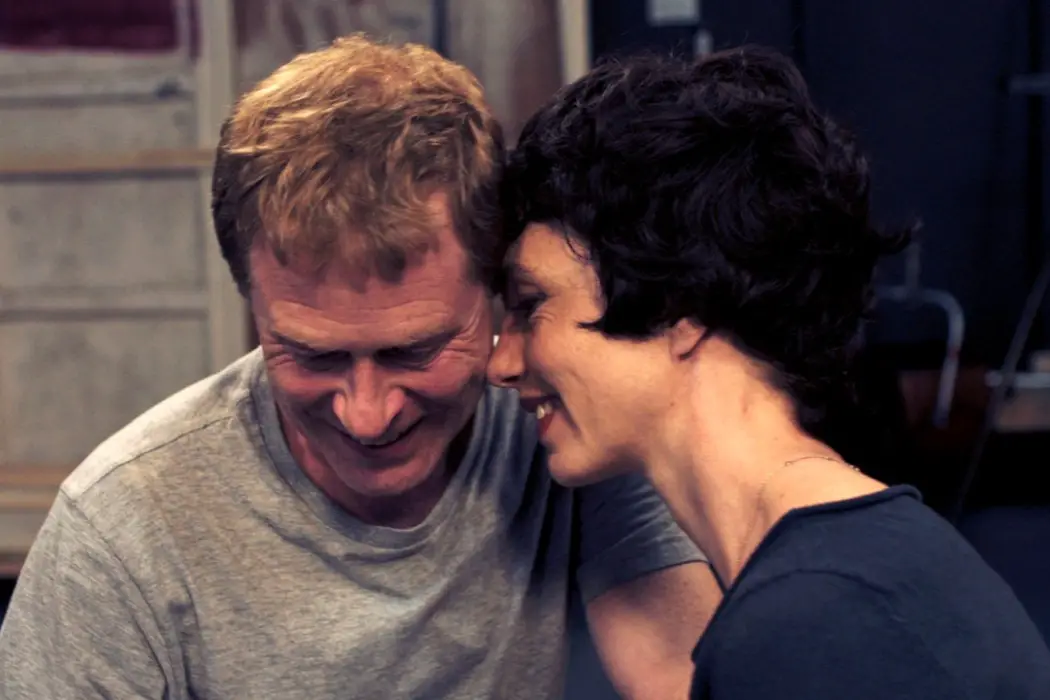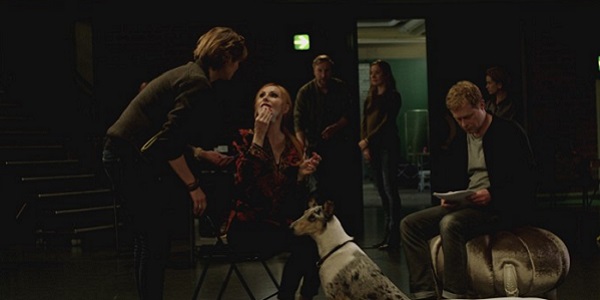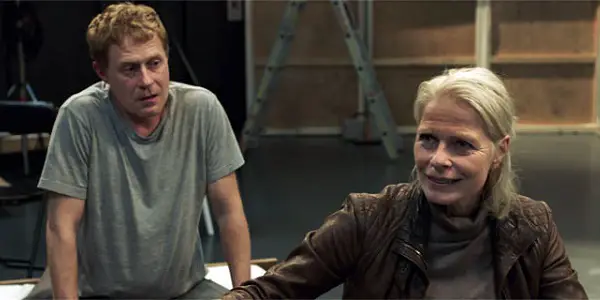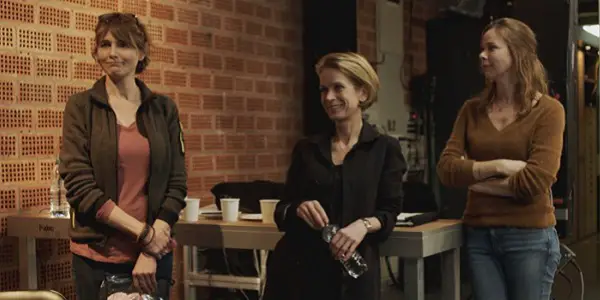CASTING: Fassbinder’s Legacy Lives On In This Spirited German Film

Lee Jutton has directed short films starring a killer toaster,…
One of the best-known films by legendary German New Wave filmmaker Rainer Werner Fassbinder is his 1972 adaptation of his own play, The Bitter Tears of Petra von Kant. Shot entirely on one set with an all-women cast, the film looks at the dark, twisted side of love (or what we convince ourselves is love) when it veers into codependency.
Petra (Margit Carstensen), a renowned fashion designer, becomes infatuated with a younger woman, Karin (Hanna Schygulla), while her long-suffering, silent assistant Marlene (Irm Hermann) looks on. The relationship dynamics between these three women are all about possession and obsession. Petra thrives on controlling and abusing both Karin and Marlene, not to mention the other people who flit in and out of her life. In the end, she is left alone with only herself to torture.
The sadomasochistic relationship study that is at the core of The Bitter Tears of Petra von Kant can be seen echoed in many films that have been released in the decades since. Most recently, and prominently, is Paul Thomas Anderson’s Phantom Thread, which examines the emotional tug-of-war that exists between control freak Reynolds Woodc*ck (Daniel Day-Lewis), another renowned fashion designer in Petra’s mold, and Alma (Vicky Krieps), the waitress he brings into his home as his new muse.
While the relationship between Reynolds and Alma ends up thriving once they realize how their darknesses feed into each other’s souls, the shadows cast by Petra and Karin still lay heavy upon their faces. Like Petra and Karin before them, their relationship is a power struggle between an older artist who believes they deserve to hold all of the cards — as though talent guarantees entitlement — and a younger muse who desires more than to just be a pretty puppet.
Petra von Kant Revisited
The legacy of The Bitter Tears of Petra von Kant lives on in Casting, which I saw on April 8 as part of the annual Kino Festival celebrating German films in New York. The film, directed by Nicholas Wackerbarth from an original script by Wackerbarth and Hannes Held, debuted in Germany late last year and is currently up for three Lolas — the German equivalent of the Oscars.
If you are familiar with The Bitter Tears of Petra von Kant, Casting is a worthy tribute to that film and the nuanced way it examines power and desperation. But even if you are not familiar with Fassbinder’s masterpiece, Casting stands on its own as a hilarious examination of the lengths one will go to secure what one believes is one’s rightful place in the world.

Vera (Judith Engel) is a documentarian set to make her television film directorial debut with a remake of The Bitter Tears of Petra von Kant, set to coincide with what would have been Fassbinder’s 75th birthday. A deeply insecure woman who appears to feel ashamed of her late debut in the world of film (not to mention her late motherhood) Vera is incapable of making a decision about who should play Petra, and it is driving the rest of the crew insane. As the first scheduled day of shooting approaches, Vera continues bringing in a variety of illustrious actresses, some for their third or fourth callbacks, but continues to claim that none of them fit her vision.
Meanwhile, Gerwin (Andreas Lust), a jobbing actor who has mostly given up on his acting career to open a bar with his boyfriend, enjoys his role as scene partner for the auditions, acting out the lead male role of Karl (a gender-swapped Karin) opposite famous actresses who he has admired for years. When the young man originally cast as Karl drops out due to scheduling conflicts, Gerwin begins to harbor hopes that he could finally win the role of a lifetime, especially as Vera begins to trust his instincts more and more with each audition. But are his hopes misguided?
Hilarity With a Side of Hurt
Casting is rich with that embarrassing, awkward, cover-your-eyes style of humor that Toni Erdmann proved Germans could do oh so well. As portrayed by the remarkably funny Lust, Gerwin is a lovable and sympathetic character. Yet at the same time, his actions are almost constantly cringeworthy.
From when he abruptly and excessively changes his tune after a legendary actress says she hated a project that he loved, to when he mentions the name of another auditioning actress in front of a woman who assumed she had the role, to when he discovers that an actress he previously worked with and had fun with doesn’t even remember him.

Gerwin is an outsider on set, both because of his sexuality, which is treated as a joke by the crew, and because of his role as mere audition partner, someone who is devoting hours of his time to a project that he likely won’t even be in. He starts out just happy to be there, but the more time he spends on set, the more desperate he becomes to secure the role of Karl for himself. Watching his actions become more haphazard as he begins to succumb to that desperation is both terrifying and relatable.
Casting takes the disturbing power dynamics of the original Fassbinder film and places them in the world of film production – quite possibly one of the most insanely hierarchical and power-driven industries out there. Like the original film, it is primarily confined to one location, the film set that will become Petra’s flat. Producer Manfred (Stephan Grossman) struggles to assert himself over Vera and force her to pick a lead, while Vera, as weak as she constantly appears on set, fights back at every turn.
She has waited so long to be in the position she’s in now that even if she really isn’t ready for it, she refuses to give an inch of it. Casting director Ruth (Milena Dreißig) grows increasingly frustrated as she puts herself out on a limb time and time again to get great actresses to come in and audition for Vera, only to be continually told that they aren’t the right ones. In some ways, Ruth appears to have all the power, but when it comes down to it, she has none.

The various actresses who come to audition have limited screen time, but each in their own way adds something remarkable to the film. One of the standouts is Luise (Corinna Kirchhoff), an older actress who sees great parts like Petra slipping away from her and her peers just because of their age. Luise is Vera’s first choice for the role because of her considerable talent, but the powers that be think she is far too old for their leading man.
When Vera refuses to confirm that Luise has the part, knowing that another actress is coming in to audition the next day, Luise’s hurt and betrayal are laid bare on her face. As Hollywood continues to value youth over experience, it’s impossible not to feel Luise’s pain.
Conclusion: Casting
You can almost boil down all of human history to instances in which we have tried to exert power over one another. It is a universal struggle, even if it is one that we’d like to pretend we aren’t personally involved in, demurring that we’re happy just the way we are. Casting forces us to look at the lengths we go to get what we want and the way we treat others who stand in our way. It’s often ugly, often hilarious, and always entertaining — a worthy successor to the film its characters strive to remake.
What do you think? Does Casting sound like an accurate depiction of the relationship dynamics on a film set? Share your thoughts in the comments below.
International release dates for Casting can be found here.
Does content like this matter to you?
Become a Member and support film journalism. Unlock access to all of Film Inquiry`s great articles. Join a community of like-minded readers who are passionate about cinema - get access to our private members Network, give back to independent filmmakers, and more.
Lee Jutton has directed short films starring a killer toaster, a killer Christmas tree, and a not-killer leopard. Her writing has appeared in publications such as Film School Rejects, Bitch: A Feminist Response to Pop Culture, Bitch Flicks, TV Fanatic, and Just Press Play. When not watching, making, or writing about films, she can usually be found on Twitter obsessing over soccer, BTS, and her cat.













